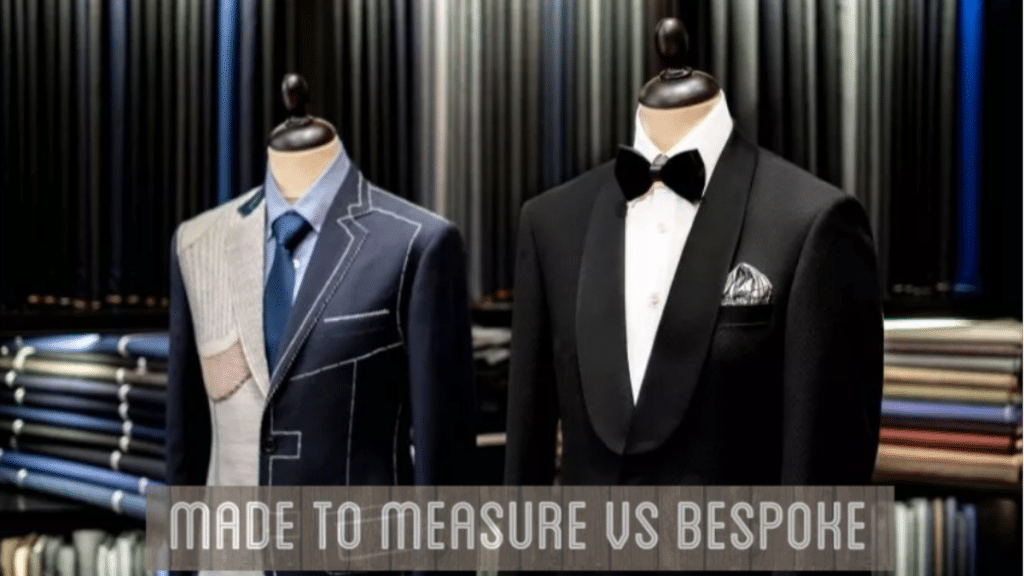When searching for a tailor-made suit, you may encounter terms like “made-to-measure” and “bespoke” tailoring. Made-to-measure vs. bespoke suits are two tailoring words that are frequently used interchangeably. The general public frequently mistakes these for the same thing. This is mainly because many tailors use these names interchangeably when marketing their companies.
However, those who understand the fundamentals know that these are two distinct terms. While there are some similarities, assuming made-to-measure vs. bespoke suits are the same is a common mistake.
This article will define the terms and compare the two tailoring styles and will help you make an informed selection whether you’re looking for a personalized suit or want to enhance your understanding of fitted apparel.
Understanding the Differences Between MTM vs. Bespoke Suit
To better comprehend made-to-measure vs. bespoke suits, let’s explore the critical distinctions between the two:
1. Definition of Made-to-Measure Vs. Bespoke Suit:
i. Made-to-Measure Suit:
MTM suits are tailored garments created based on a pre-existing pattern with slight modifications to fit the customer’s measurements. The process involves adjusting specific critical measurements of the suit, such as sleeve length, waist circumference, and jacket length, to accommodate the wearer’s body shape. Made-to-measure suits offer a degree of customization while using a standardized pattern.
ii. Bespoke Suit:
Bespoke suits, on the other hand, are entirely handcrafted from scratch, starting with a unique paper pattern that is individually drawn for each customer. Bespoke tailors take extensive measurements of the customer’s body, accounting for various factors such as shoulder angles, posture, and sleeve angles. The term “bespoke” means “ordered to be made,” signifying these suits’ highly personalized and individualized nature.
2. History of Made-to-Measure Vs. Bespoke Suit:
i. Bespoke Suit History:
The tradition of bespoke tailoring dates back centuries, with origins in European craftsmanship. It gained prominence in the early 19th century in London, where master tailors handcrafted suits for the British aristocracy. Over time, bespoke tailoring became synonymous with luxury, known for its impeccable fit, quality materials, and meticulous attention to detail.
ii. Made-to-Measure Suit History:
Made-to-measure tailoring emerged as a response to the increasing demand for customized suits while offering a more cost-effective and time-efficient solution than bespoke suits. Large luxury brands began offering made-to-measure services to give customers some personalization without the extensive handwork involved in bespoke tailoring. This approach allowed for a broader reach and accessibility of tailored garments.
3. Production Process of Made-to-Measure Vs. Bespoke Suit:
i. Made-to-Measure Suit Process:
In the made-to-measure process, customers typically select from a range of pre-designed patterns and styles the tailor or brand offers. They undergo a fitting session where various measurements are taken to customize the standard pattern. These measurements adjust the suit’s proportions, ensuring a better fit. The suit is then manufactured using the modified pattern, taking into account the customer’s specifications.
ii. Bespoke Suit Process:
Bespoke tailoring involves a highly personalized and collaborative process between the customer and the tailor. It starts with an initial consultation, discussing the customer’s preferences, style, and body measurements. The tailor creates a unique pattern based on these measurements and the desired style. Multiple fittings and adjustments follow, allowing the tailor to refine the fit and shape of the suit until it meets the customer’s expectations.

4. Production Time of Made-to-Measure Vs. Bespoke Suit:
i. Made-to-Measure Suit Production Time:
Made-to-measure suits generally have a shorter production time compared to bespoke suits. Depending on the tailor or brand, the process can take weeks, with one or two fitting sessions required. The standardized patterns and streamlined production methods contribute to the shorter turnaround time.
ii. Bespoke Suit Production Time:
Bespoke suits require a longer production time due to the intricate and labor-intensive nature of the process. Completing a bespoke suit can take anywhere from weeks to even months. Multiple fittings and meticulous handwork are involved at each stage, resulting in a longer turnaround time.
5. Price of Made-to-Measure Vs. Bespoke Suit:
i. Made-to-Measure Suit Price:
Made-to-measure suits are typically less expensive than bespoke suits. The price can vary depending on the tailor or brand, fabric choice, and level of customization. Generally, made-to-measure suits start from around hundreds of pounds and can increase depending on the fabric quality and additional customizations.
ii. Bespoke Suit Price:
Bespoke suits are considered luxury items with a higher price tag than made-to-measure suits. The cost of a bespoke suit is influenced by factors such as the tailor’s reputation, the quality of materials, craftsmanship, and the level of customization. Prices for bespoke suits often start from thousands of pounds and can significantly increase depending on the fabric and intricate details.
6. Customization Level of Made-to-Measure Vs. Bespoke Suit:
i. Made-to-Measure Suit Customization:
Made-to-measure suits offer a moderate level of customization. Customers can choose from various fabrics, linings, buttons, and basic style options. However, the degree of customization may vary depending on the tailor or brand. While made-to-measure allows for personalization within a set range of options, it may have limitations compared to bespoke.
ii. Bespoke Suit Customization:
Bespoke suits are considered luxury items with a higher price tag than made-to-measure suits. The cost of a bespoke suit is influenced by factors such as the tailor’s reputation, the quality of materials, craftsmanship, and the level of customization. Prices for bespoke suits often start from thousands of pounds and can significantly increase depending on the fabric and intricate details.
In summary, made-to-measure suits offer a more accessible and cost-effective option with moderate customization, shorter production time, and a good fit.

About Kutetailor
When finding the perfect made-to-measure suit, Kutetailor is an excellent option. With their expertise in tailoring and commitment to quality, Kutetailor offers a range of made-to-measure suits that combine craftsmanship and customization to create garments that fit you perfectly. Kutetailor is a pioneer in intelligent manufacturing and has been a prominent player in the garment industry since 1995. As a one-stop custom clothing manufacturer, they provide fashion brands and businesses with tailor-made suits and other apparel products. Their factory is one of the first smart garment factories globally, incorporating self-design, smart tailoring, and intelligent production, allowing for a 7-10 day delivery time.
So please don’t wait; experience the excellence of Kutetailor’s one-stop MTM platform and trust them as your preferred custom clothing manufacturer.

